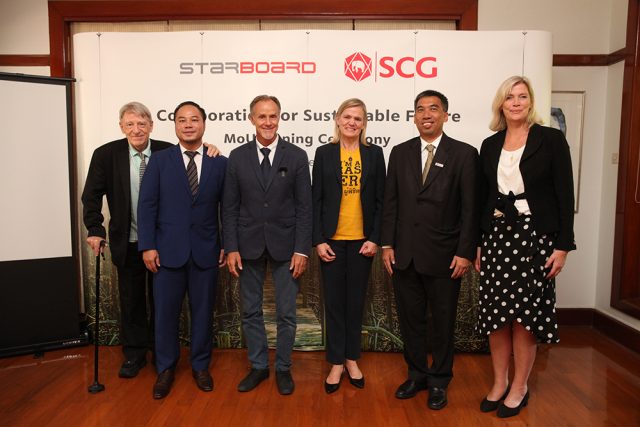
A recently announced agreement between Starboard and Siam Cement Group (SCG) will see the two companies work together in what could be Thailand’s most interesting green partnership. And while on the surface it may seem like an unlikely pairing, the duo actually shares a common vision.
Starboard’s commitment to the environment is as well known these days as its surfboards. It was one of the first companies to become carbon past positive, a commitment that will see the business balance its current carbon footprint as well as the footprint created during Starboard’s entire 25-year history.
The world of stand-up paddle boards, windsurf boards and other water sports products may seem miles away from SCG’s core business of concrete, building material and chemical manufacturing, but the pair did recognise each other as industry leaders. When discussions took place, both sides saw a desire to find new ways where they could innovate sustainability. This led to the signing of an MOU and the formation of Thailand‘s most interesting green partnership.
“The partnership developed very organically. The dialogue is very open. We spent a lot of time exploring capabilities and how we could learn from one another. The scope of the agreement is a testament to that,” Tasmin Chilcott, Starboard Eco Project Coordinator, says. “When you think about a large corporation, the stereotype is that they are very rigid and slow moving, but SCG wasn’t like that at all. This has allowed us to create a very meaningful partnership.”
What does Thailand’s most interesting green partnership include?
One area SCG is looking to become involved with is Starboard’s mangrove tree planting efforts. A single mangrove tree can absorb up to one tonne of carbon over 20 years. The company created the Starboard Mangrove Project and works with World View international (WIF) to plant trees at the Thor Heyerdahl climate park in Myanmar.
“SCG is considering different options for planting trees, but the Starboard Mangrove Project with Worldview International Foundation is something they are very interested in,” Chilcott notes. “Even if they decide to go with another planting project to offset carbon emissions, we are still able to share what we have learned through our own experiences to ensure they create something with a long-term positive impact.”
Starboard has been very active in planting mangrove trees to offset their own carbon output. They also do the same when sponsoring events or competitions. The company will work with event organisers to absorb the emissions of electric usage and those travelling to attend. In addition to taking carbon dioxide out of the environment, mangrove trees create a healthy ocean habitat for several species.
The mangrove tree planting is only one part of the agreement between Starboard and SCG. Several other areas have been identified as potential synergy spots between the two companies.
“The partnership with SCG motivates us to explore all avenues. We want to keep pushing what is possible. We see opportunities to work directly with their scientists to develop new materials for our boards that allow us to reduce our reliance on virgin materials. That’s exciting for us,” Chilcott proclaims. “They can share knowledge in terms of what’s possible on how we can improve in building our products.”
No specifications have been made yet as Starboard and SCG investigate what can be done regarding production. This includes listing every element in all Starboard boards including the performance standards they have to meet. Chilcott hopes that together they can eliminate some virgin plastic usage and include more recycled products in future Starboard releases.
“Our goal is to be 100 percent sustainable. We aren’t there yet, but working with SCG can help us get closer to this dream. All of our boards use renewable materials, but finding ways to incorporate more without sacrificing performance is important to us,” Chilcott reports. “Having a partner like SCG gives us more freedom to find solutions and test them out much faster than on our own. A lot of what we do is now is trial and error, so having that SCG expertise is an incredible asset.”
Click here to read the full article in the Norway-Asia Business Review Magazine.

































